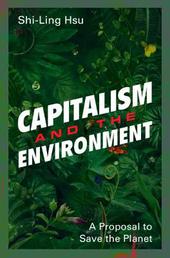
|
Capitalism and the Environment: A Proposal to Save the Planet
Hardback
Main Details
| Title |
Capitalism and the Environment: A Proposal to Save the Planet
|
| Authors and Contributors |
By (author) Shi-Ling Hsu
|
| Physical Properties |
| Format:Hardback | | Pages:400 | | Dimensions(mm): Height 235,Width 157 |
|
| Category/Genre | Development economics
Political economy |
|---|
| ISBN/Barcode |
9781108474825
|
| Classifications | Dewey:333.72 |
|---|
| Audience | | Professional & Vocational | |
|---|
| Illustrations |
Worked examples or Exercises; Worked examples or Exercises
|
|
Publishing Details |
| Publisher |
Cambridge University Press
|
| Imprint |
Cambridge University Press
|
| Publication Date |
9 December 2021 |
| Publication Country |
United Kingdom
|
Description
Rising economic inequality has put capitalism on trial globally. At the same time, existential environmental threats worsen while corporations continue to pollute and distort government policy. These twin crises have converged in calls to revamp government and economic systems and to revisit socialism, given up for dead only 30 years ago. In Capitalism and the Environment, Shi-Ling Hsu argues that such an impulse, if enacted, will ultimately harm the environment. Hsu argues that inequality and environmental calamities are political failures - the result of bad decision-making - and not a symptom of capitalism. Like socialism, capitalism is composed of political choices. This book proposes that we make a different set of choices to better harness the transformative power of capitalism, which will allow us to reverse course and save the environment.
Author Biography
Shi-Ling Hsu is the D'Alemberte Professor of Law at the Florida State University College of Law and is the author of The Case for a Carbon Tax and co-author of Ocean and Coastal Resources Law.
Reviews'Capitalism and the Environment proposes nothing less than a dramatic transformation of our existing economic system in support of a more sustainable future. At the heart of Professor Hsu's vision of transformed capitalism lies a structure of environmental taxes meant to: make polluters pay for the harm they cause, create incentives for environmental care, spur innovation, unleash entrepreneurial energy, and flow capital toward environmental restoration. Sweeping in scope with penetrating insights in every chapter, Capitalism and the Environment is essential reading for anyone who cares about moving our planet onto a sustainable trajectory.' Dan Esty, Hillhouse Professor of Environmental Law and Policy, Yale University, and editor of A Better Planet: 40 Big Ideas for a Sustainable Future 'Modern environmental problems are frequently offered as one of the most common critiques of capitalism. But here, Shi-Ling Hsu argues convincingly that financial incentives delivered through price signals - one of the fundamental forces of capitalism - provide the best solution to challenges usually associated with atmospheric physics or toxic chemicals. Hsu provides an expansive view of how taxation can be used against key environmental challenges. Even if you disagree with the need to tax carbon, cows, or water consumption, this book offers a provocative view of a world made better by different incentives. Correctly guided, capitalism can deliver a prosperous and sustainable future.' Jerry Taylor, President, Niskanen Center 'In this important and informative book, written in the shadow of potentially disastrous climate change, Professor Hsu explains why an enlightened capitalism represents our best chance to restore environmental wellbeing. He argues that conventional unenlightened capitalism can slide into rigid protection of the status quo as well as wildly excessive overuse of seemingly 'free' environmental resources. But Hsu also shows how prudent and creative countermeasures, particularly well-designed environmental taxes, can correct these deviations and restore capitalism to its appropriate qualities of nimbleness, innovation, and balanced resource use.' Carol Rose, Gordon Bradford Tweedy Professor Emeritus of Law and Organization, Yale Law School 'Professor Shi-Ling Hsu, a prolific and highly influential environmental law scholar, has produced an important book on how to address environmental crises. The public policy community will need to take seriously his argument that a market-based economy has appropriate tools to confront these serious problems, by taxing pollution, generating environmental knowledge, and thinking deeply about possible consequences before undertaking investments with long-term impacts. Professor's Hsu clear and dispassionate analysis should also help bridge some gaps in our divided polity.' Richard L. Revesz, AnBryce Professor of Law and Dean Emeritus, New York University School of Law
|